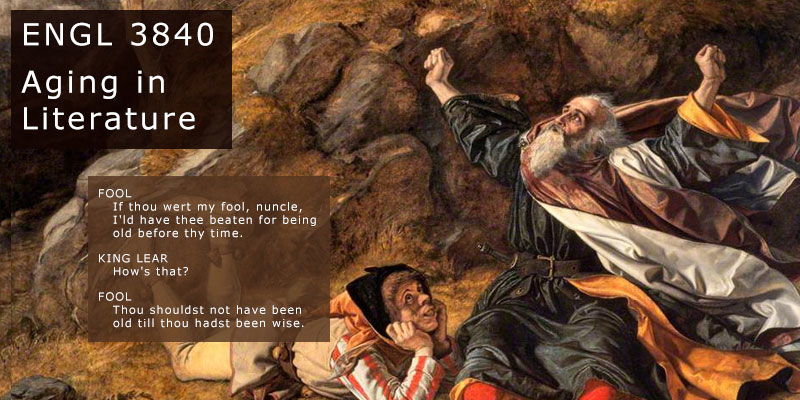Catalog Description
Prerequisites: Completion of Blocks A and B4, an additional course from Block B, and at least one course each from Blocks C and D. Examines representations of old age in literary works from a range of periods, forms, genres, and cultures. Examines the part that aging plays in human experience. UD GE C (cl)
Course Description
At fifty, Professor David Lurie in J.M. Coetzee’s Disgrace thinks it’s perhaps time for him to renounce all desire, tie up the loose ends of his life, and “turn [his] mind to the proper business of the old: preparing to die.” Unwilling to bow to the strictures of age and society, however, Lurie claims his “right to desire” and has an affair with a young female student of his, thus condemning himself to a perpetual state of disgrace. Coetzee’s novel dramatizes only one of the many predicaments that the elderly often experience. Social alienation, physical dependence, psychological vulnerability, and moral restrictions, constitute some of the challenges that mark and define the lived experiences of the elderly in many societies today. And it is such experiences that students in ENGL 3840 will explore through a wide range of literary works from around the world.
ENGL 3840 will, then, examine the passage of life as it is portrayed in a large body of contemporary world literatures. Reading widely and closely, the students will explore the process of human aging within a wide array of cultural contexts (South Africa, India, Middle East, Britain, Germany, Ireland and Canada) and from various historical, social, ethical, and aesthetic perspectives. By prompting the students to reflect on the inevitability of our aging and mortality, these culture-specific texts will help them understand not only what it means to grow old but also what it means to be human. The exploration of the experiences of aging across diverse cultures, in conjunction with various community-based assignments, will offer students the opportunity to deepen their inter-cultural understanding, develop their civic engagement skills, expand their capacity for sympathy, and ultimately realize their full potential as social human beings. Topics covered may include, but are not limited to, maturity and loss, ethics of care, aging and/in the community, geriatric sexuality, middle age crisis, poetics of memory, death and mourning, aging and melancholia, etc.
Community Engagement: ENGL 3840 is offered in light of the new Community Engagement requirement for upper-division General Education courses. As defined by the Association of American Colleges and Universities, civic engagement within the academic context involves “working to make a difference in the civic life of our communities and developing the combination of knowledge, skills, values and motivation to make that difference. It means promoting the quality of life in a community, through both political and non-political processes.” ENGL 3840 lends itself to such a community engagement framework: it is an ideal course for students to engage tangibly and empathically with the reality of vulnerable groups in their community. For example, faculty might choose to incorporate a community engagement component by assigning projects that require students to organize special events or activities at a designated senior center in the Los Angeles area and produce a detailed reflective account of their experience. Another project may require them to research the current state of the senior living industry by conducting and incorporating first-hand interviews with representatives from various institutions and agencies (home care agencies, senior living developers, retirement communities, assisted-living homes, etc.). Students may then hold a campus or public event or participate in an annual English Department GE Community Engagement symposium to share their findings with students in other English GE courses.
Learning Outcomes
Upon completion of this course, students will be able to
- engage in critical analysis of texts dealing with the processes of human aging
- voice their opinions about literature, culture, and the theme of aging
- demonstrate healthy sensitivity to other cultures and traditions by approaching issues from different historical, philosophical, ethical, and aesthetic perspectives
Students who complete the civic learning/community engagement courses will be able to
- connect academic learning/disciplinary knowledge and civic participation
- demonstrate understanding of their impact on their respective physical, social and cultural environments and how such environments impact them
- demonstrate knowledge of ways to make change in local and global communities
- collaborate with others in order to develop and implement an approach to a civic issue.
Course Outline
The content and focus of the class depends on the individual faculty member teaching it and can engage with literary texts from antiquity up to the present. The following is one potential manifestation of the course outline:
Unit One: Poetics of Memory
John Banville, The Sea (Ireland)
Margret Laurence, The Stone Angel (Canada)
Unit Two: Politics and Poetics of Geriatric Desire
J.M. Coetzee, Disgrace OR Andre Brink’s The Rights of Desire (South Africa)
Thomas Mann, Death in Venice (Germany)
Unit Three: Aging and Melancholia
Kazuo Ishoguro, The Remains of the Day (Britain)
Naguib Mahfouz, The Beggar (Egypt)
Unit Four: Aging and the Ethics of Care
Mistry, Family Matters (India)
About the Banner: Detail from "King Lear and the Fool in the Storm" by William Dyce (ca. 1851) (image from http://en.wikipedia.org/wiki/William_Dyce#/media/File:Kinglearpainting.jpeg)
